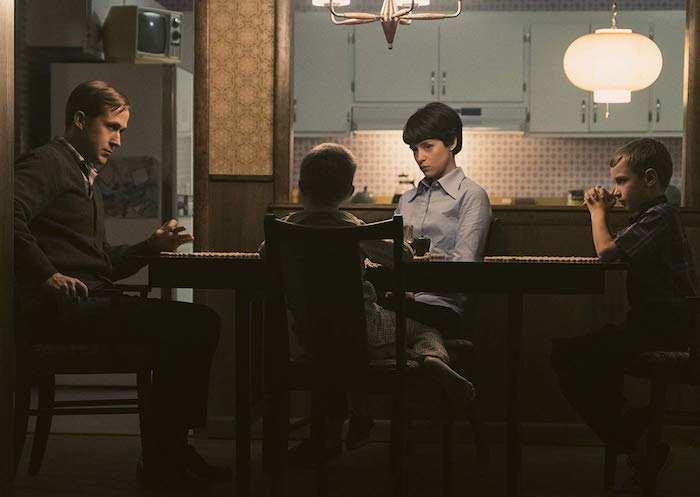Supporting actor and actress awards allow for a broad arena of recognized performances. The Oscars, in particular, have honored work of all shapes and sizes, lengths ranging from two minutes to more than an hour of screen time. There is no rule dictated by the Academy to what constitutes a supporting performance, and that leads to criticisms of “category fraud” on occasion. But the awards are not for best minor performance or best scene-stealing work by a character actor. A supporting performance should refer to one that truly lifts the lead actor or actress up and maybe even carries the whole movie.
Claire Foy gives that sort of performance in First Man, and she does so magnificently. To the degree that I came away accepting the film as mostly hers. Ryan Gosling stars in the leading role of Neil Armstrong, the main character in the biopic focused on his life up to the point where he became the first person to walk on the Moon. His is a fairly boring performance, perhaps intentionally so, but also he’s again just playing another bland white guy partly standing on the shoulders of others and taking full credit for saving an integral part of America, this time its reputation rather than its music.
As Armstrong’s first wife, Janet, Foy is the thankless 1960s housewife who keeps everything going in the family while the husband literally spends all his time and attention in another world. Being the wife of an astronaut and mother to his children is a difficult enough job for the usual tasks of running the home but also involves the added worry about the strong chance that her husband and father of her children will be killed on the job. The role of the wife in a movie is often regarded as an unfortunate sideline position for actresses. Not this one. Foy’s Janet is constantly getting in the game and calling the shots.
Janet is not a nag, as some critics might view her as. She is proud of her husband and concerned about him, and she has every right to also want him to be a great man at home as well as in outer space. And the character seems to seep into the performance level of the film, as well. When Janet makes Neil sit at the kitchen table and talk to his two sons before embarking on his dangerous mission to the Moon, it also plays like Foy is setting Gosling up for his big scene, assisting in fostering his performance and making him finally deliver some interesting acting in the film.

We’ve seen the astronaut wife character before, typically as part of an ensemble of women’s parts, and even if some have stood out as individuals as in the cases of Mary Jo Deschanel and Veronica Cartwright in The Right Stuff and Kathleen Quinlan in Apollo 13, these are all performances are reactions to what’s going on with the leads. They consist of watching their husbands, waiting with watery eyes for the missions to go well, and maybe they have some distinctive trait such as a stutter but it’s always about how that relates to what their leading man is doing. Those wives wouldn’t exist without the husbands. They are extensions of the male characters. They could be cut and the movies would still work for the most part. Janet, on the other hand, is someone who could really be the main character of First Man if the film decided to do that, with Neil secondary. His character often plays as an extension of her, not the other way around.
Foy as Janet is constantly busy, in her actions or her facial expressions, which emphasize how much is likely on her mind at all times. The performance is in turn full of deliberation. Foy does appear to be Acting with a capital A a lot of the time, mostly due to the accent she needs to maintain — even if that accent sounds all wrong for the Chicago-born Janet, more mid-Atlantic than Midwestern to my ears, it’s pretty consistent — yet she’s also remarkably natural in the documentary-style homelife sequences. She fittingly is able to exhibit a different form of her performance as director Damien Chazelle (with his DP, Linus Sandgren) exhibits a different cinematographic form of his film.
The success of Foy’s performance surprised me. She’s been great in The Crown, for which she’s won a Golden Globe and an Emmy, but she’s had a lot of time to develop her take on young Queen Elizabeth over time, growing with it as the character grew, and she hasn’t always been given a lot in the role to prove her range. Ahead of her work in First Man came another performance as an American character in Steven Soderbergh’s Unsane, and frankly she’s quite bad in the part. Her accent keeps slipping and she never comes across as a real human being. I’ve been skeptical about her upcoming stint as Lisbeth Salander in The Girl in the Spider’s Web, but I also expected her Janet Armstrong to be a forgettable wisp of a part.
If she is ignored come Oscar time, and that’s possible if First Man falls by the wayside due to public disfavor and poor box office for the film, I hope that more screenwriters and filmmakers at least pay notice to the performance and the part so that the role of wife of the main character stops being regarded as such a lesser one. They’re not secondary citizens in life and they shouldn’t be accessories on screen even if they’re second-level characters. Janet Armstrong may not be the protagonist or a lead, but she’s a very important part of and for First Man. Foy takes it to the heights that it deserves.
The post Claire Foy is the Very Definition of a Best Supporting Actress in ‘First Man’ appeared first on Film School Rejects.



0 comments:
Post a Comment